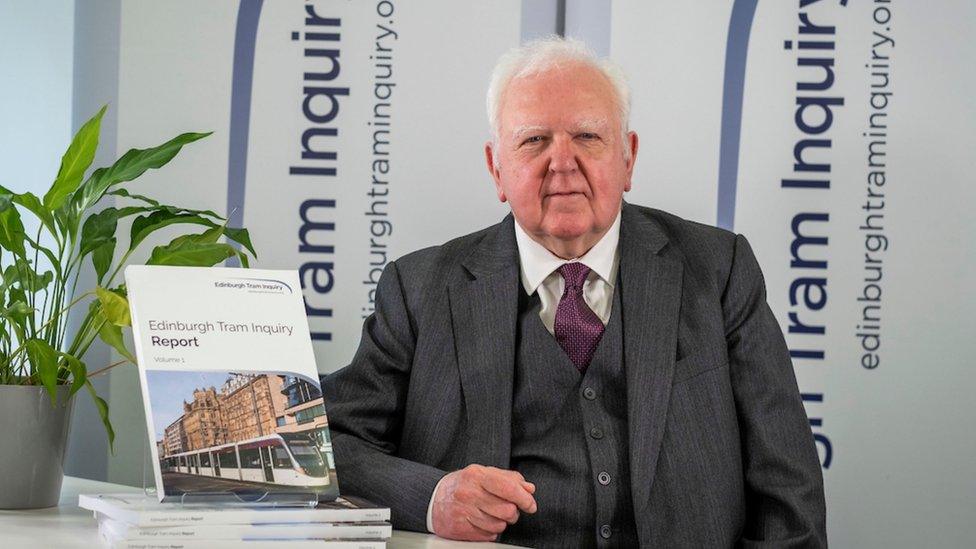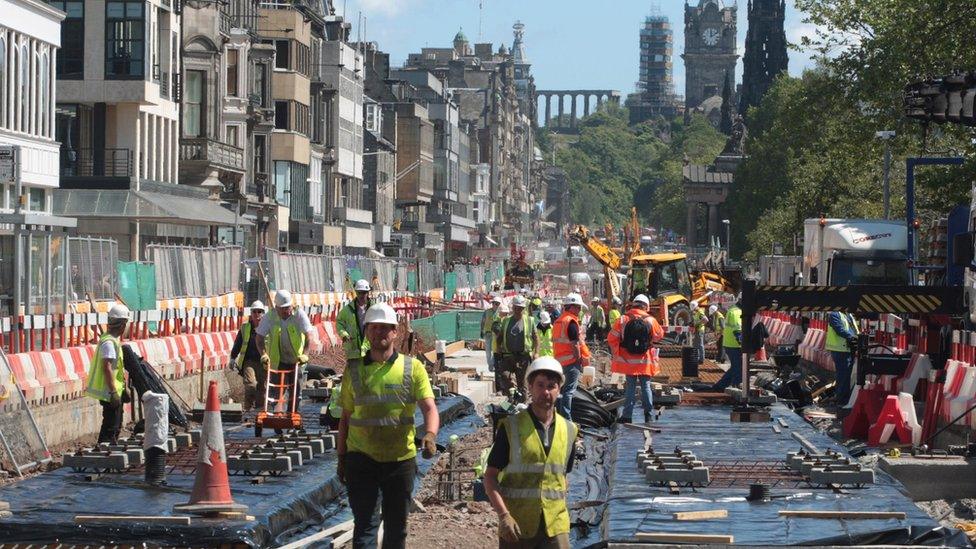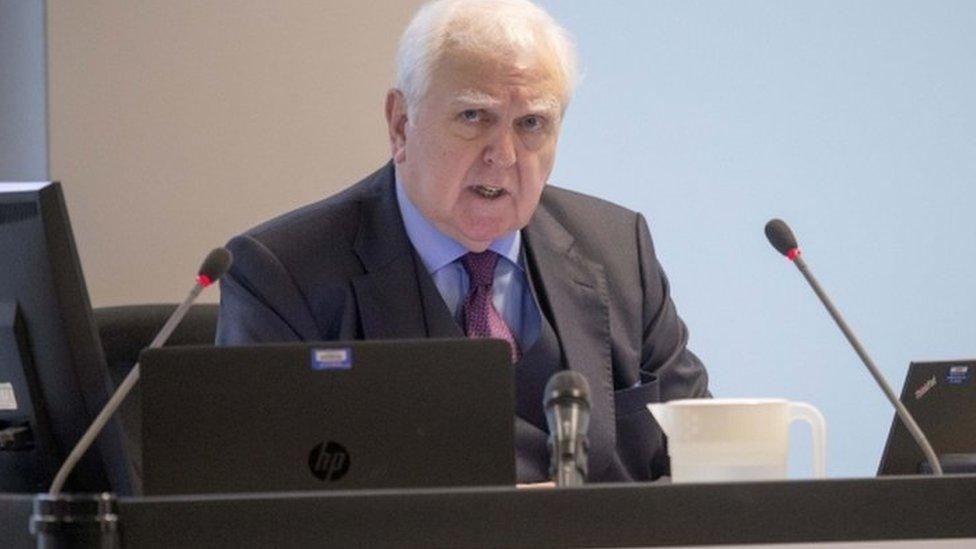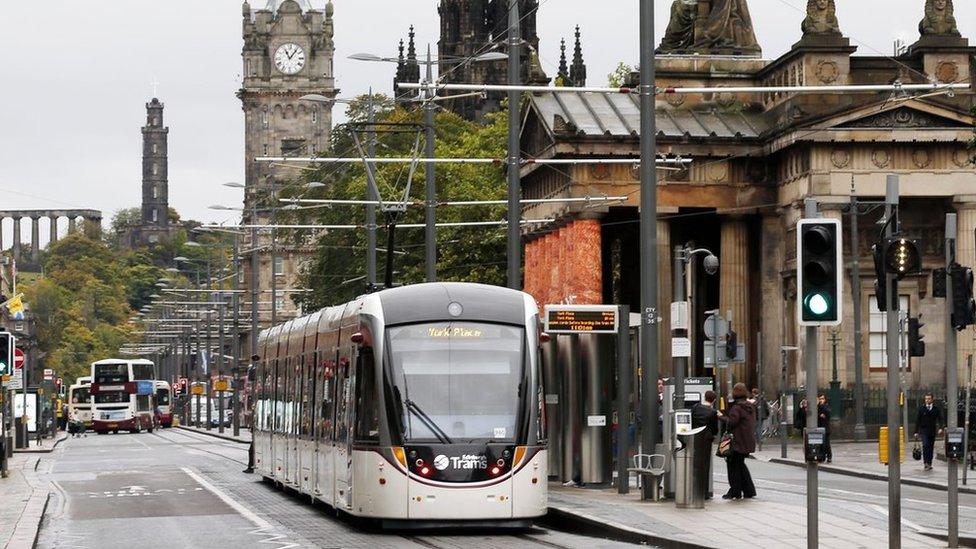'Litany of avoidable failures' in Edinburgh tram project
- Published

A "litany of avoidable failures" was to blame for the delayed Edinburgh Trams project, a public inquiry has concluded.
The inquiry was established in June 2014 to find out why the city's tram project was £400m over budget and five years late.
Chaired by Lord Hardie, the probe has cost the taxpayer more than £13m.
It concludes failings by the City of Edinburgh Council and its arm's-length companies were to blame for the delays.
The 8.7 mile (14km) route from Edinburgh airport to the city centre opened in 2014, five years later than planned.
Lord Hardie issued a video message with his report where much of his criticism centres on the arm's-length company in charge of the tram project known as Tie.
He said: "Tie's failures were the principal cause of the failure to deliver the project on time and within budget" but added that the City of Edinburgh Council "must also share principal responsibility with Tie for the delays in design".
The inquiry chairman also said that the Scottish government "recognised their mistake in withdrawing the oversight of Transport Scotland officials designed to protect the public purse" when problems emerged with the project.

The inquiry was led by Lord Hardie
The inquiry's review has also put a new price tag on the cost of the first tram line after concluding the previously reported cost of £776.7m was an underestimate.
Taking in allocated costs to other budgets that truly related to the tram project and an unreported substantial claim by a landowner, the final cost, according to the inquiry, is £835.7m.
Lord Hardie was not available to answer questions from the media about why the inquiry had taken so long and its overall cost, which at more than £13m is more than the Chilcot Inquiry into the Iraq War.
But in a video clip he cited the complexity of the inquiry, which involved reviewing millions of documents, and said the net cost to the public purse was reduced to £8.7m using existing public resources that were not replaced.
'Litany of avoidable failures'
Lord Hardie sets out 24 recommendations, including considering whether there is a requirement for new laws to allow for civil and criminal sanctions against individuals or companies that knowingly submit reports that include false statements to councillors.
He said: "What is clear from the inquiry's work is that there was a litany of avoidable failures on the parts of several parties whose role it was to ensure that public funding was spent effectively and to the benefit of Scotland's taxpayers, and that the Edinburgh Trams Project was delivered efficiently.
"Poor management and abdication of responsibility on a large scale have had a significant and lasting impact on the lives and livelihoods of Edinburgh residents, and the reputation of the city."
Where the tram project went wrong
The inquiry report, external highlights the principal causes of the project failing as:
Tie's departure from the procurement strategy that had been intended to manage risk out of the project
The failure of Tie to work collaboratively with the council and other partners
Delay with production of design due to poor performance by contractor Parsons Brinckerhof
Tie underestimating the cost of the project and taking on too many of the risks
A lack of clarity on who did what in the complicated running of the scheme
The "lost opportunity" of oversight when the Scottish government withdrew the involvement in the project of Transport Scotland officials

Princes Street in the heart of Edinburgh was ripped up to make way for the new tram line
Scottish Conservative MSP for the Lothians Miles Briggs said: "Lord Hardie is highly critical of councillors and the arms-length bodies responsible for the project - but he also singles out Scottish government for criticism.
"He is clear that ministers failed to protect the public purse and acted in the SNP's political interests, rather than the public interest."
Cabinet Secretary for Transport Mairi McAllan said the Scottish government would take time to consider the report's detail and the recommendations but added: "The inquiry took too long, was too costly and in some instances the evidence heard does not support the conclusion drawn".


It's worth remembering that the SNP government had wanted to scrap the Edinburgh Trams project.
Indeed the party's manifesto in 2007 contained a commitment to abandon the project.
However, the SNP didn't have a majority at Holyrood and the opposition parties united to outvote the Scottish government, forcing it to press ahead with the scheme.
Lord Hardie is critical of then finance secretary John Swinney's decision to instruct Transport Scotland to "scale back" its involvement with the project.
He concludes that meant that important safeguards were removed.
He also reveals that it was seen as such a significant change that officials considered seeking a ministerial direction - which is a rarely used formal instruction to act - despite an objection from civil servants.
In the event, one wasn't requested.
Related topics
- Published19 September 2023

- Published22 June 2023

- Published30 August 2022

- Published5 June 2020
